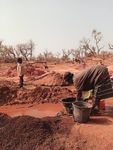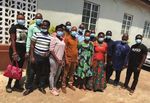HUMAN TRAFFICKING RESEARCH - ABOUT CenHTRO: UGA School of Social Work
←
→
Page content transcription
If your browser does not render page correctly, please read the page content below
Newsletter Vol. 1 | August 2021
BUILDING GLOBAL CAPACITY FOR
HUMAN TRAFFICKING RESEARCH
ABOUT CenHTRO: INSIDE THIS ISSUE:
The Center on Human Trafficking Research & Outreach (CenHTRO)
was established in May 2021 as the new research home of the • Sierra Leone National Launch
African Programming and Research Initiative to End Slavery • Address from Sierra Leone’s
(APRIES). Vice President
The specific aims of the Center are to enhance the science of • Country briefs from Guinea,
human trafficking prevalence measurement across the globe;
Senegal, and Sierra Leone
to implement effective anti-trafficking policies and innovative
• Updates from the Prevalence
programs that protect victims, prevent trafficking, strengthen
prosection, and enhance partnership; and to equip the next Reduction Innovation Forum
generation of human trafficking researcher with competencies (PRIF)
that can enhance social justice for trafficking survivors and victims. • Meet the Team
Sierra Leone Program National Launch
APRIES held a virtual launch event for its anti-trafficking
program in Sierra Leone on March 2, 2021 in partnership
with the U.S. Department of State Office to Monitor
and Combat Trafficking in Persons, the U.S. Embassy in
Sierra Leone, and implementing partner World Hope
International (WHI). APRIES Director, Dr. David Okech,
presented preliminary findings of APRIES’ innovative
household survey to estimate the prevalence of child
trafficking in Kenema, Kono, and Kailahun regions of
Sierra Leone program. Mr. Saidu Kanu, Country Director
of WHI, presented plans for WHI’s anti-trafficking
program. Over 2,500 attendees attended the launch on Members of the enumerator team from Conflict
Management and Development Associates (CMDA) Sierra
Zoom and Facebook Live. Leone
The launch highlighted the Government of Sierra Leone’s commitment to the fight against child trafficking.
The Honorable Dr. Mohamed Juldeh Jalloh, Vice President of the Republic of Sierra Leone, was the keynote
speaker. He spoke highly of the APRIES project and announced national (Sierra Leone) and regional
(ECOWAS and Mauritania) conferences dedicated to anti-TIP efforts. Other government speakers at the
virtual event were the Honorable Ministers of Social Welfare, Gender and Children’s Affairs, and Local
Government.
“APRIES’ launch has already enhanced inter-ministerial collaboration among key government ministries
and resource mobilization efforts in the fight against child trafficking in Sierra Leone,” said Umaru Fofanah,
APRIES Country Coordinator. Following the launch, APRIES was also invited to join the planning committee
for the Vice President’s national anti-trafficking stakeholder conference. APRIES’ Sierra Leone team greatly
looks forward to continuing our work implementing effective anti-trafficking programs and working closely
with government stakeholders.
1Newsletter Vol. 1 |August 2021
Address from the Honorable Dr. Mohamed
Juldeh Jalloh, Vice President of Sierra Leone
The Government of Sierra Leone is committed to the well-being of its children
by enabling them to prepare for a brighter future. One threat to the future of
children across the globe and in Sierra Leone is child trafficking. Children can be
trafficked for forced labour and sexual exploitation. Over the last three years, the
government has taken significant steps to combat the threat through elaborating a
National Action Plan against Trafficking in Persons, especially Women and Children
(2021-2023) and the establishment of the district level task force, institutional reforms, and capacity
building, and solid engagement with foreign missions abroad. The progressive efforts have enabled Sierra
Leone to move from the Tier 2 watch list on trafficking in persons to tier 2 on the US State department
rating.
The African Programming and Research Initiative to End Slavery’s (APRIES) work commendably focused on
using evidence-based data to inform policy and programs through various interventions that emphasize
community-based engagement, local expertise, and partnership with the relevant government institutions
and local authorities. I was honored to give the keynote address during the official launch of the Sierra
Leone Program Against Child Trafficking in March 2021. I am also excited that new projects that target
Kambia District are about to commence. On behalf of the Government of Sierra Leone, we commit to
seeing the success of the projects and continued support from the relevant government agencies and
ministries. Building on this, the Government will organize a national conference on trafficking that will lead
to a regional conference to help bolster regional-wide dynamics in the fight against trafficking in persons.
Letter from Dr. David Okech, CenHTRO Director
In the last half year, we have experienced tremendous transformations and
made great progress in our projects. APRIES is now an initiative within the
interdisciplinary Center on Human Trafficking Research & Outreach (CenHTRO).
The goal of CenHTRO is to be a global leader in human trafficking research,
policy, and programming innovation. Some of our accomplishments include the
completion of the Sierra Leone baseline report, identification of implementation
partners in Senegal, and overcoming COVID 19 and other logistical obstacles to
complete data collection in Guinea. The Prevalence Research Innovation Forum
Research (PRIF) teams in Brazil, Costa Rica, Morocco, Pakistan, Tanzania, and
Tunisia are also in the process of beginning formative research that will compare
two or more prevalence estimation methods within a hotspot. PRIF is part of our contribution in extending
the science of prevalence estimation worldwide. I am very proud of our faculty, staff, graduate assistants
as well as all our partners across the globe who continue to work diligently to measurably reduce human
trafficking. Our funder, The US Department of State Office to Monitor and Combat Trafficking in Persons has
continued to provide support that is so needed to accomplish these projects. It is hard work but it is worth
every effort. In the next months, we will be disseminating reports from our countries of operation in West
Africa and hope to build on existing work to expand to other countries in the region.
2 APRIES is now an initiative of CenHTRONewsletter Vol. 1 |August 2021
Message from Dr. Marsha Davis, Dean of
College of Public Health at University of
Georgia
As Dean of the College of Public Health, I am grateful that public health is part
of the important work of APRIES. Why public health? Human trafficking and
modern-day slavery are immensely complex problems that require expertise
and input from multiple disciplines to address. What was once considered
primarily a criminal justice concern is now recognized as a complex public
health issue with wide-reaching consequences. While a criminal justice–
focused approach intervenes at the perpetrator level, a public health
approach focuses on identifying risk and protective factors, developing
interventions for prevention, and caring for the survivors’ mental and physical
well-being post-trafficking. APRIES has brought together faculty across
campus, from law, political science, psychology, social work, and, public health to enhance the knowledge we
need to enable officials and local agencies to reduce this problem. We celebrate and value this collaboration
because of this power to find meaningful and actionable solutions to difficult issues. I look forward to not
only seeing the impact of our collective work on human trafficking, but also on enhancing interdisciplinary
research, training, and service for our faculty and students.
CENHTRO VISION STATEMENT
“To become the leading hub for human trafficking research, policy,
and programming development across the globe.”
Guinea enumerators collecting data in the field
3 APRIES is now an initiative of CenHTRONewsletter Vol. 1 |August 2021
COUNTRY UPDATES
From February to end of March this year 2021, APRIES, through
its local research partner Stat View International, organized a
Guinea
refresher training for 30 data collectors. They were deployed
to 145 enumeration areas for a quantitative survey, with a
total sample of 3045 households in both urban and rural
areas, and with the full support of the local authorities and the
communities themselves. A challenging mission but fun, as one
of the teams had to travel 6 hours over the ocean to interview
households in one of the hotspots.
APRIES has also been able to co-design its programming
activities with two different NGOs in protection services
and prosecution, respectively. The implementing
partner for protection services is a consortium of
two local NGOs, the first one, Sabou Guinée, has a
long-standing experience in child protection; they
have managed eight transit centers throughout
the country. The second one, called FMK, has
implemented many projects in child health, child
education and women’s empowerment. The
protection services consist of identifying, providing APRIES Country Coordinator, Mr. Bangoura Ansoumane, with
the Governor of Boké
direct care and family/community reintegration
to 100 trafficked children. The prosecution is
co-designed with MDT (Les Mêmes Droits pour Tous), a non-profit human rights organization known in
Guinea for being very active in human rights advocacy, including fighting against female genital mutilation,
gender-based violence, and the arbitrary detention of prisoners. Prosecution focuses on capacity building
of magistrates, law enforcement and local NGOs including local child protection structures to detect,
investigate, prosecute and judge perpetrators. APRIES has the support of the Guinea national anti-trafficking
committee, the CNLTPA.
APRIES recruits World Hope International (WHI) to imple-
ment an anti-trafficking program using the Prevention,
Protection and Prosecution strategies in Kailahun, Kene-
Sierra Leone
ma and Kono districts. APRIES worked closely with WHI
to ensure a successful start to their anti- trafficking proj-
ect by coordinating site visits and developing a rigorous
monitoring and evaluation process. The Prevention and
Response to Child Trafficking in Persons (PARC-TIP) fund-
ing has two sub-projects, both of which aim to decrease
the prevalence of child trafficking in Kenema, Kono, and
Kailahun respectively. With APRIES funding and technical
support, WHI has served survivors, hired and oriented
new staff, and deployed project field staff in the three
hotspots.
4 APRIES is now an initiative of CenHTRONewsletter Vol. 1 |August 2021
APRIES Country Coordinator, Umaru Fofanah, has closely collaborated with WHI to have engagements
with the Ministry of Social Welfare, Ministry of Gender and Children’s Affairs, Ministry of Justice, Ministry
of Local Government, Ministry of Labour, Sierra Leone Police and the Freetown City Council. Mr. Fofanah
has been actively involved with the National TIP Task Force Secretariat and he is a member of the Standing
Committee on Stakeholder and Policy Strengthening. APRIES is also part of a committee to plan the Nation-
al Anti-Trafficking Stakeholder Conference to be hosted by The Honorable Dr. Mohamed Juldeh Jalloh, Vice
President of the Republic of Sierra Leone. Mr. Fofanah participated in a Facebook live event in commemo-
ration of National Slavery and Human Trafficking Preven-
tion month organized by the US Mission in Sierra Leone.
He was also a speaker at a Social Work Symposium held
by the Social Science department at the Milton Margai
College of Education and Technology, Goderich Campus
in Freetown. In addition to Freetown engagements, Mr.
Fofanah conducted extensive stakeholder engagement
and research in Kambia.
APRIES’ research partner, CMDA-SL, conducted qualita-
tive research in Kambia, which has been identified as a
APRIES Country Coordinator, Mr. Umaru Fofanah, along
child trafficking hotspot. CMDA-SL research assistants with WHI staff meeting with Her Worship Yvonne Aki-
successfully completed 20 interviews in total. Research Sawyer, Mayor of Freetown (2nd from left)
assistants interviewed survivors of child trafficking,
parents of survivors, and key NGO staff. In addition, research assistants conducted focus group discussions
about child trafficking with a cross-section of community members.
APRIES’ Senegal office is commited to building a multipartite
partnership to reduce the prevalence of girls’ sexual exploitation
Senegal
in Kédougou, a region located in
the southeastern part of Senegal.
Since launching these activities in
September 2020, APRIES has been
working to build a partnership
with national institutions, civil
society organizations and various
local actors to characterize and
quantify the dimensions of
human trafficking in this country,
particularly sexual exploitation,
and to propose concerted response strategies.
In addition to meetings with key ministries, our Country Coordinator Mrs.
Aminata Diagne Barre carried out a field mission to Kédougou in March
2021. This mission allowed the team to better understand the local context,
gather views and insights from heads of local technical services, actors APRIES Country Coordinator, Mrs.
and authorities, and identify an appropriate approach for contextualizing Aminata Diane Barr meeting with
Mrs. Mariama Diallo, Kédougou
research and programming activities. Indeed, working to reduce the sexual
Régional Président of Bajenu Gokh
exploitation of girls in Kédougou means overcoming numerous obstacles
that are geographical, environmental, social, economic and cultural.
Among the solutions to be considered, local actors recommended the implementation of an awareness
and communication strategy to change attitudes and perceptions, a restructuring and reorganization of the
5 APRIES is now an initiative of CenHTRONewsletter Vol. 1 |August 2021
mining sub-sector, a reinforcement of the fight against
land grabbing, and an adequate involvement of mining
companies. They also mentioned facilitating access
to basic social services and economic opportunities
for at risk girls and victims, strengthening prevention,
protection, law enforcement, internal and border
security while creating special units dedicated to the
fight against human trafficking.
APRIES' approach is to work hand in hand with
government structures, considering each of them
as strategic partners with key roles in supporting
and accompanying initiatives aimed at Prevention,
Protection and Law Enforcement. Furthermore, the
upcoming creation of the CenHTRO think tank will be a
symbol of inclusiveness in tackling one of the greatest
scourges of modern times.
Woman sieving gold at the gold mines in Kharakhena in
Kédougou in March 2021
PREVALENCE REDUCTION INNOVATION FORUM UPDATE
During the past several months, we made substantial progress on the Prevalence Reduction Innovation
Forum (PRIF) project that was launched in May of 2020 to compare and document the robustness of
various methodological approaches in human trafficking prevalence research throughout the world. One
PRIF-related product we are very excited about is the development of standardized trafficking questions to
be used in surveys. With collaboration from the U.S. Department of State Office to Monitor and Combat
Trafficking in Persons and the research teams, we developed survey questions for each human trafficking
indicator that makes up the following seven categories: 1) recruitment, 2) employment practices and
penalties, 3) personal life and properties, 4) degrading conditions, 5) freedom of movement, 6) debt
or dependency, and 7) violence or threats of violence. These seven categories are included in the PRIF
Statistical Definitions Document. We plan on making the final survey questions public during the next
quarter.
In collaboration with the WZB Berlin Social Science Center in Germany, we have also been working on
finalizing a simulation meta-analysis study, including the implementation of procedures for measurement
of uncertainty for respondent-driven sampling (RDS) samples and for probability proportional to size (PPS)
and time-location sampling (TLS) samples. The meta-analysis will also asses the cost-benefit analyses of
each trafficking prevalence estimation method.
Despite the challenges brought by COVID-19, the PRIF research teams have been working with their local
in-country collaborators to monitor the situations in our research sites within Brazil, Costa Rica, Morocco,
Pakistan, Tanzania, and Tunisia. Teams have developed COVID-19 protocols for the protection of the
field staff and study participants. The seven research teams have also made progress on their formative
assessment protocols that will inform their surveys, and on their Internal Review Board documents and
training manuals. They have also identified local NGOs that could serve as potential stakeholders for key
informant interviews. Despite the challenges associated with the pandemic, researchers will be able to
begin their formative research during the summer.
6 APRIES is now an initiative of CenHTRONewsletter Vol. 1 |August 2021
APRIES TEAM AROUND THE WORLD
APRIES Staff (in alphabetical order):
Fahmida Afroz, Pre-doctoral Fellow Hope Dockweiler, Graduate Research Assistant
Dr. Lydia Aletraris, Project Coordinator Umaru Fofanah, Sierra Leone Country Coordinator
Dr. Alex Balch, Associate Director Dr. Nathan Hansen, Intervention Coordinator
Ansoumane Bangoura, Guinea Country Coordinator Tenshi Kawashima, Pre-doctoral Fellow
Dr. Claire Bolton, Assistant Director Jiacheng Li, Pre-doctoral Fellow
Justine Bruder, Pre-doctoral Fellow Dr. David Okech, Founder and Director
Dr. Tamora Callands, Training and Evaluation Nnenne Onyioha-Clayton, Senegal Program Manager
Coordinator Dr. Rebecca Poon, Monitoring, Evaluation, Research
Dr. Jody Clay-Warner, Associate Director and Learning Coordinator
Dr. Anna Cody, Assistant Research Scientist Elyssa Schroeder, Pre-doctoral Fellow
Aminata Diagne Barre, Senegal Country Coordinator Travis Williams, Graduate Research Assistant
Elke Yath, Business Manager
Dr. Hui Yi, Assistant Research Scientist
7 APRIES is now an initiative of CenHTROYou can also read



























































